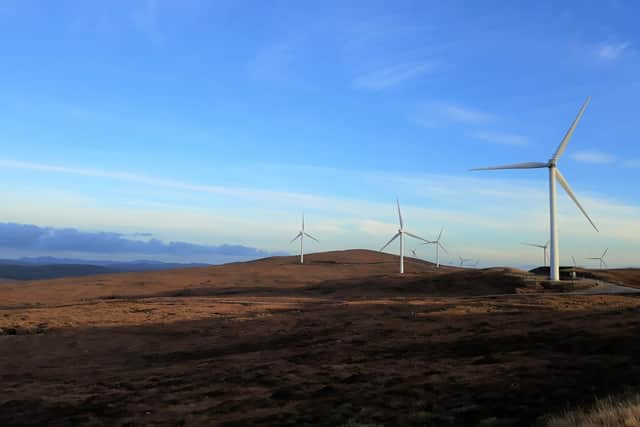Public inquiry into ‘mega wind farm’ in Scottish Highlands that would be three times taller than Wallace Monument gets under way in Sutherland
The proposals, by German energy company Energiekontor UK, could see windmills three times taller than the landmark Wallace Monument constructed near one of the UK’s most famous salmon fishing rivers.
The 11 turbines would be situated on the skyline around a mile from homes in the scenic villages of Rosehall, Altass and Brae and not far from the River Oykel – a special area of conservation – in Sutherland.
Advertisement
Hide AdAdvertisement
Hide AdOpponents of the 73MW Strath Oykel wind farm have warned that the development could badly affect important tourism in the area and threaten the survival of threatened native wildlife such as wild salmon and endangered freshwater pearl mussels.
If consented, Strath Oykel would be the fifth wind farm to be built in the area.
There are already 34 turbines at the Rosehall and Achany wind farms, with a further 26 due to go up in two schemes which were consented earlier this year – the Achany Extension and Meall Buidhe.
The 11 new turbines at Strath Oykel, standing 200m from base to tip, would be among the tallest built so far in Scotland.


The plans, which have sparked hundreds of objections, have already twice been rejected by Highland councillors due to concerns over individual and cumulative impacts on the local landscape.
Now Scottish Government officials are holding a three-day hearing to consider the evidence, due to conclude on Thursday.
Residents from Rosehall, Altass and Brae and a local wind farm protest group have been battling to halt the scheme, including hiring a planning expert to represent them at the inquiry hearing.
They say small rural communities in Scotland are being attacked by a “relentless march” of wind farm developments in the drive to hit climate change goals and cash in on green initiatives.
Advertisement
Hide AdAdvertisement
Hide AdA spokesperson for the No Ring of Steel campaign group said: “Strath Oykel will see turbines 200 metres tall, which will be among some of the largest structures ever built in Scotland.
“To put it into perspective, they will be three times as tall as the Wallace Monument and situated just a short distance from people’s homes.
“We understand the need for more renewable energy sources, but our community is now at a tipping point with the number of wind farm developments, and we had no other option but to make a stand.
“This is very much a David V Goliath situation – a small community going up against a German energy company listed on the stock exchange.
“We have been fighting this application for three years and it has cost us thousands to make our voice heard.
“But we are determined to make our case to the Scottish Government that enough is enough and other more suitable sites must be found for these types of mega wind farm developments.”
Tracey Smith, a local tourism business owner, added: “The cumulative impact of this development going ahead will have devastating consequences for the local economy, which is heavily reliant on rural tourism.
“Although we are a small community we have two hotels, two B&Bs, several self-catering properties and many local businesses offering outdoor activities.
Advertisement
Hide AdAdvertisement
Hide Ad“But mega developments like the Strath Oykel windfarm risk destroying the day-to-day lives of those who live here and the many businesses who depend on tourism.”
The developers also intend to build a new bridge over the River Oykel, which has sparked concerns that the water and ecosystem could be contaminated during construction.
Hundreds of lorries are expected to pass through the communities as the site is developed, with recent plans revealing an access route cutting through residents’ gardens and animal paddocks.
The Scottish Government has set out an ambition to deploy 20GW of onshore wind by 2030 – more than double the country’s current operational capacity of 9.3GW.
Under Section 36 of the Electricity Act 1989, applications for energy schemes with an operating capacity of 50MW must seek consent from Scottish ministers.
Although local councils don’t have the power to approve or refuse a proposal, they are asked to consider plans – objections can result in a public inquiry.
Comments
Want to join the conversation? Please or to comment on this article.